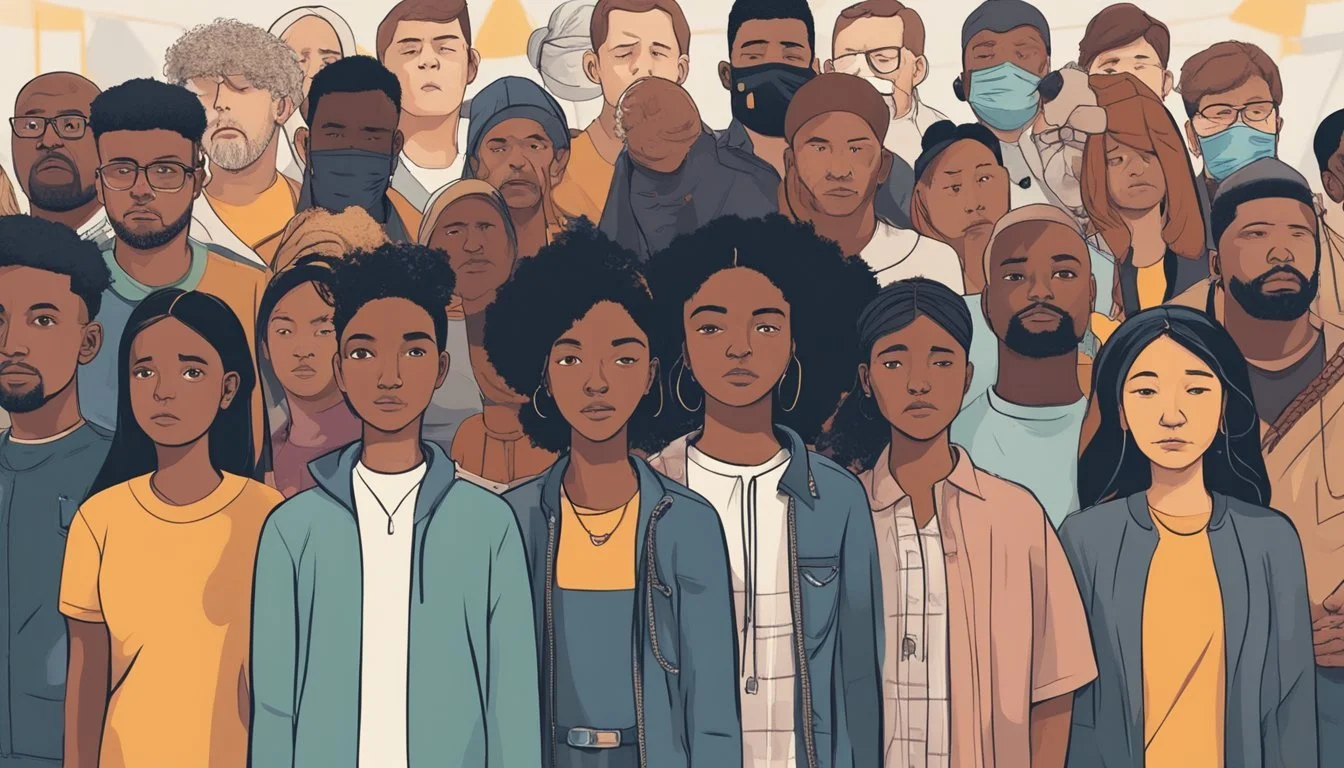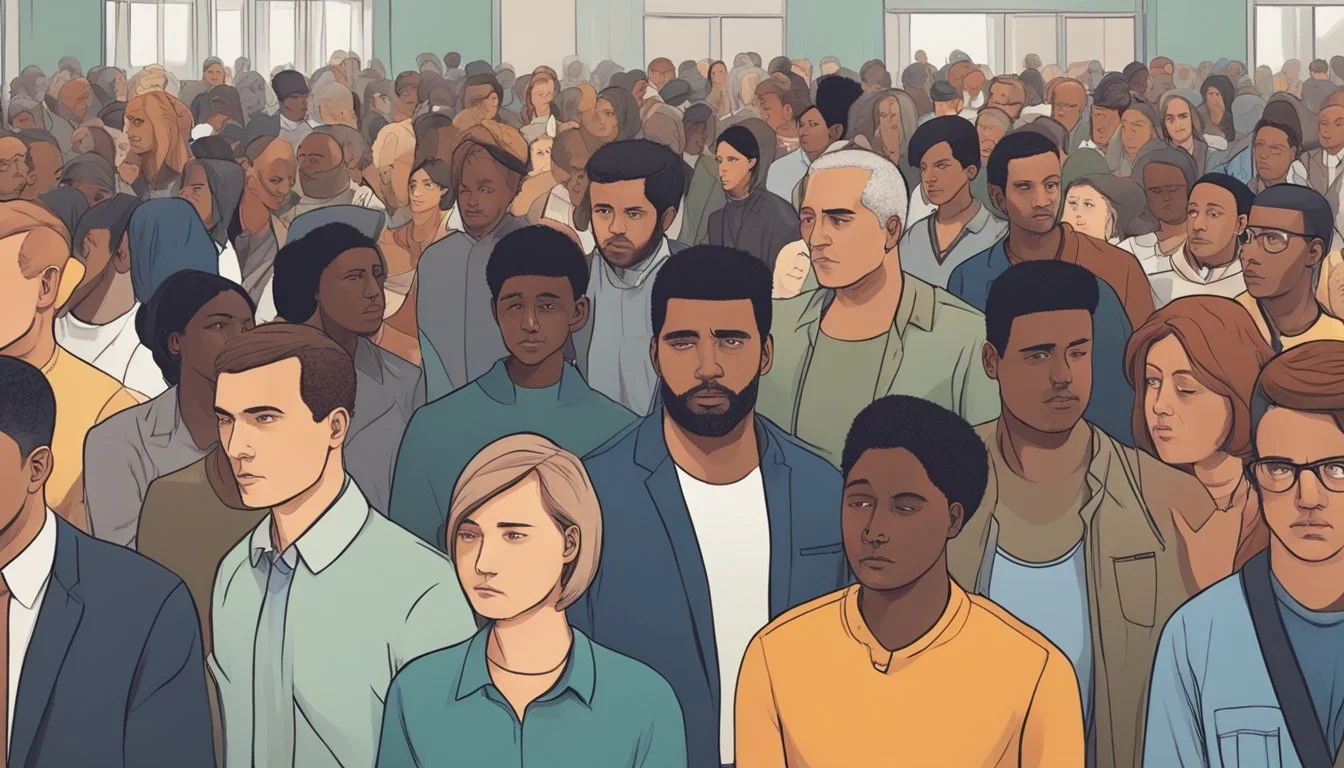12 Signs You May Be Experiencing Racial Trauma
How to Recognize and Address It
Racial trauma stems from repeated exposure to racial discrimination, bias, and violence. These experiences can deeply impact mental and emotional well-being, leading to various symptoms and challenges in daily life. Recognizing these signs is crucial for anyone facing such distress.
Understanding the indicators of racial trauma can help individuals seek the proper support and resources. This article will explore the subtle and prominent signs that may indicate someone is experiencing racial trauma, providing clarity and guidance for those affected.
1) Frequent feelings of anxiety or panic when discussing race
Individuals experiencing racial trauma often report anxiety or panic when the topic of race arises. This anxiety can manifest physically through rapid heartbeat, sweating, or shortness of breath.
These reactions may stem from past negative experiences with racial discrimination or the fear of facing prejudice again. Conversations about race can trigger these emotional responses, making it difficult for them to engage in discussions.
This heightened stress response can impact daily life and social interactions. It's important to recognize these signs and seek support. Limiting exposure to stressful media content about race can provide some relief, as suggested by the APA.
2) Avoiding Racial Conversations or Interactions
A common sign of racial trauma is the avoidance of conversations or interactions that involve race. Individuals may feel exhausted by the constant need to explain their experiences.
This avoidance can be a coping mechanism to protect themselves from further distress.
People might steer clear of friends, colleagues, or social settings where racial topics are likely to arise. They may also avoid news or media that frequently discusses racial incidents.
For some, this avoidance helps temporarily manage anxiety or emotional pain. Over time, it can impact their social relationships and mental health.
Avoidance can lead to isolation, making it harder to find community support. Engaging in culturally affirming activities can provide some relief and connection.
Recognizing this pattern of avoidance is crucial for seeking appropriate support and addressing the root causes of racial trauma.
3) Constantly feeling on edge in diverse social settings
Feeling on edge in diverse social settings can be a sign of racial trauma. Individuals may experience heightened anxiety when interacting with people from different racial or ethnic backgrounds. This anxiety may stem from past experiences of discrimination or racial bias.
Hypervigilance is a common outcome. People might constantly scan their environment for potential threats or microaggressions. This hyper-awareness can interfere with their ability to relax and enjoy social interactions.
Emotional responses such as increased heart rate, sweating, or difficulty breathing may manifest during social gatherings. These physical symptoms result from the stress and fear of encountering racial hostility.
People navigating racial trauma may avoid diverse social settings altogether. This avoidance is a coping mechanism to prevent the potential re-traumatization that varied interactions can trigger.
This persistent state of unease impacts personal and professional relationships. Feeling unsafe or uncomfortable in diverse environments limits social engagement and meaningful connections with others.
Understanding these signs within oneself or others can foster empathy and encourage supportive measures to create safer, more inclusive spaces. For further details on the impacts and coping mechanisms, refer to this article on racial trauma.
4) Difficulty Trusting People of Other Races
Experiencing racial trauma can lead to challenges in forming trusting relationships with people from different racial backgrounds. This lack of trust often stems from past experiences of discrimination, bias, or racism.
Individuals may become cautious around those who remind them of previous negative encounters. This can result in increased vigilance and wariness in interactions.
A person might start avoiding social settings or professional environments where they feel vulnerable. This behavior can affect their social life, work performance, and overall well-being.
Internalized fears and stereotyping can further complicate interactions. These fears often serve as protective mechanisms, but they also hinder meaningful connections.
Building trust again requires safe, positive experiences and active efforts to challenge and change these ingrained perceptions. Over time, supportive and inclusive environments can help in rebuilding this essential trust.
5) Persistent feelings of sadness related to racial experiences
Individuals experiencing racial trauma often grapple with persistent feelings of sadness. These feelings stem from the mental and emotional strain of enduring repeated acts of discrimination and prejudice.
Such experiences can leave lasting impressions, causing individuals to feel isolated and misunderstood. The continuous exposure to racially charged incidents can lead to an ongoing state of hopelessness and sorrow.
Persistent sadness can manifest in daily life, affecting overall mood and motivation. These emotions can become overwhelming, making it difficult for individuals to engage in social activities or maintain relationships.
Memories of past racial encounters resurface, triggering waves of sadness. These emotional responses are not just momentary but can linger, influencing an individual's mental well-being over extended periods.
The repeated encounters with racism can create a profound sense of loss and disappointment. This can be further exacerbated when one's efforts to address or overcome these issues are met with resistance or dismissal.
6) Recurrent thoughts or flashbacks of racial incidents
Individuals experiencing racial trauma often struggle with recurrent thoughts or flashbacks of racist incidents. These intrusive memories can be triggered by various stimuli, such as conversations, media coverage, or even specific locations associated with past trauma.
These flashbacks might manifest as vivid and distressing images or experiences that can disrupt daily functioning. They are akin to those experienced by people with PTSD, causing significant mental and emotional discomfort.
People affected may find themselves reliving discriminatory events, which revives the associated emotional pain. This constant re-experiencing can lead to heightened anxiety and ongoing stress.
Such recurrent thoughts can also result in physical symptoms, like heart palpitations or stomach aches, reflecting the body's response to the mental distress. These reactions demonstrate how deeply racial trauma can impact both mental and physical health.
7) Feeling physically ill during or after racial encounters
Experiencing racial trauma can manifest physically for individuals. During or after racial encounters, some individuals may feel sick or physically unwell.
This can include symptoms such as headaches, stomachaches, or muscle tension. The body reacts to the stress and emotional toll of racial trauma.
These physical symptoms are the body’s way of responding to high levels of stress. It is important to note that these manifestations can affect daily life.
For more detailed information on the physical impact of racial trauma, you can read about it on HealthyWomen.
Racial trauma has been shown to affect both mental and physical health, leading to a range of ailments.
Individuals experiencing these symptoms should seek support, such as talking to a healthcare provider or engaging in self-care practices. These steps can help manage the physical impact of racial stress.
Understanding how racial trauma can present physically is crucial in recognizing the signs and addressing them appropriately. Proper care and attention can mitigate the effects and improve overall well-being.
8) Sense of helplessness or lack of control over racial situations
Experiencing racial trauma can lead to a sense of helplessness in individuals. This feeling may manifest as an inability to influence or change racial dynamics. People may feel powerless when confronted with instances of racism.
The concept of learned helplessness relates to this state. Individuals may come to believe that their actions have no impact, leading to a passive acceptance of negative situations.
This helplessness often results in low self-esteem and decreased motivation. People may refrain from speaking out or taking action due to a belief that it will not effect change. This mindset perpetuates the cycle of racial trauma.
A pervasive sense of helplessness can further exacerbate anxiety and depressive symptoms. This emotional and psychological toll can impede one's ability to navigate and respond to racial stressors effectively.
9) Hyper-awareness of racial dynamics in public spaces
Hyper-awareness of racial dynamics is a common experience for those impacted by racial trauma.
Individuals may constantly scan their environment, gauging the racial composition of a space and anticipating potential encounters. This vigilance can be exhausting and affect their mental well-being.
In diverse settings, they might feel heightened anxiety or tension. Familiar places can lose their sense of safety, causing distress and discomfort.
In predominantly white spaces, these individuals may feel hyper-visible and on edge. They may anticipate bias or discrimination, impacting their ability to relax and engage freely.
Such heightened awareness can stem from past experiences of racism and discrimination. This constant state of alertness becomes a mechanism to navigate and mitigate potential harm.
To learn more about the concept of hypervigilance, you can explore the detailed discussion on hypervigilance among urban residents.
10) Difficulty concentrating or staying focused
Experiencing racial trauma can significantly impact an individual's ability to concentrate. This difficulty might stem from ongoing stress and anxiety related to racial discrimination or microaggressions.
Constantly being on alert for potential discriminatory encounters can drain mental resources. This mental exhaustion can make it challenging to focus on tasks that previously required minimal effort.
Moreover, trauma-related stress can lead to disturbances in sleep patterns. Lack of adequate rest further exacerbates concentration issues, making day-to-day functioning more difficult.
Individuals may find themselves easily distracted by intrusive thoughts. These thoughts can relate to past experiences or anticipations of future incidents of racial bias.
Such focus issues are common among those who have endured traumatic events. Information suggests this can include varying forms of trauma, such as PTSD, anxiety, and other mental health conditions. For additional insights, see difficulty concentrating from Buoy Health.
In some cases, cognitive resources are redirected toward coping mechanisms. This redirection leaves fewer resources available for academic or professional tasks, further impairing performance.
By understanding the cause of these concentration difficulties, individuals and professionals can better address and support those experiencing racial trauma.
11) Experiencing Sleep Disturbances or Insomnia
Racial trauma often manifests in various forms of sleep disturbances, including insomnia. People grappling with racial trauma may find it difficult to fall asleep or stay asleep. This can lead to persistent fatigue and difficulty concentrating during the day.
Individuals with racial trauma might experience nightmares or night sweats. Such symptoms further disrupt their sleep pattern, making it harder to get restful sleep.
Hyperarousal and heightened alertness are common after traumatic experiences. These feelings can cause individuals to remain on edge at night, interfering with their ability to relax and sleep peacefully.
Effective sleep hygiene practices can help manage these sleep issues. Keeping the bedroom cool, dark, and quiet, and reserving it for sleep and relaxation, can contribute to better sleep.
For more strategies and information on how trauma impacts sleep, visit The Role of Trauma in Sleep Problems.
12) Increased Irritability or Anger Responses
Increased irritability or anger can be a significant indicator of racial trauma. Individuals may find themselves reacting more harshly or aggressively to situations that previously would not have provoked such strong emotions. This heightened response is often due to the chronic stress and anxiety caused by repeated exposure to racism.
Irritability may manifest as a constant state of being on edge, where even minor frustrations lead to anger outbursts. This can affect daily interactions, making it difficult to maintain personal and professional relationships. The emotional toll of enduring racial discrimination can accumulate, leading to these intense feelings.
Sudden outbursts of anger, also known as explosive anger, can become more frequent. Such outbursts might include yelling, aggressive behavior, or, in severe cases, physical violence. These reactions are often disproportionate to the triggering event, indicating deeper underlying emotional pain.
Continual exposure to racial trauma can lead to self-directed anger, turning feelings of frustration inward. This can contribute to self-blame, guilt, and feelings of inadequacy. The person may struggle with guilt over their perceived inability to cope with or change their situation.
Recognizing these signs is crucial for seeking appropriate mental health support. If these feelings of irritability or anger are persistent, professional help can provide strategies to manage and mitigate these intense emotional responses effectively. Organizations like Verywell Mind and the Cleveland Clinic offer resources for understanding and coping with these symptoms.
Understanding Racial Trauma
Racial trauma stems from repeated exposure to racism and discrimination. It impacts an individual's emotional, psychological, and physical well-being, influencing many aspects of their daily life and overall health.
Definition and Overview
Racial trauma, also known as race-based traumatic stress, is the emotional and psychological harm caused by encounters with racial bias, discrimination, and racism. Unlike other forms of trauma, it is not a single event but a series of interactions that accumulate over time. People experiencing racial trauma might suffer from conditions like anxiety, depression, or PTSD.
The effects are wide-ranging. Individuals may find it challenging to concentrate on work or school, and their overall sense of safety can be compromised. The experience of racism leads to chronic stress, exacerbating other health issues.
Historical Context
The roots of racial trauma can be traced back to historical and systemic racism. The legacy of slavery, segregation, and policies that have marginalized people of color continues to manifest in contemporary society. These historical instances of racism have laid the groundwork for ongoing discrimination and bias.
Racial trauma is perpetuated by persistent stereotypes, cultural exclusion, and institutional barriers. Initiatives aimed at reparative justice and equality are crucial in addressing these deep-seated issues. Community support, education, and policy changes play a significant role in the healing process. Understanding the historical context is vital to comprehending the full scope of racial trauma and its lasting impact.
Psychological and Emotional Impact of Racial Trauma
Racial trauma can lead to significant psychological and emotional challenges. These effects can manifest in both immediate symptoms and long-term consequences that impact daily life.
Common Symptoms
Individuals experiencing racial trauma often show symptoms such as anxiety, depression, and panic attacks. These psychological responses stem from witnessing or experiencing racial discrimination and can disrupt personal and professional life.
Low self-esteem and self-worth are also common. People may feel isolated or alienated from their community or larger society.
Dissociative symptoms and hypervigilance can occur. This often appears as a constant state of alertness or feeling disconnected from reality, making routine activities challenging.
Intrusive thoughts and flashbacks related to traumatic racial events can lead to distress. Frequent exposure to media depicting racism exacerbates these issues.
Long-term Effects
The long-term effects of racial trauma can be profound and enduring. Chronic stress resulting from repeated exposure to racism can lead to severe health problems like hypertension, cardiovascular diseases, and compromised immune function.
Children exposed to racial trauma can face developmental and behavioral issues as early as age 12. These issues may include difficulty concentrating in school, lower academic performance, and behavioral problems.
Adults may experience intimate relationship difficulties and social withdrawal. Trust issues and fear of judgment often lead to reduced social interactions.
Occupational and financial challenges are common. Individuals may struggle to maintain steady employment or face workplace discrimination, further perpetuating a cycle of stress and anxiety.
Damage to cultural and personal identity can occur. Continuous exposure to racial bias can make individuals question their value and role in society.











